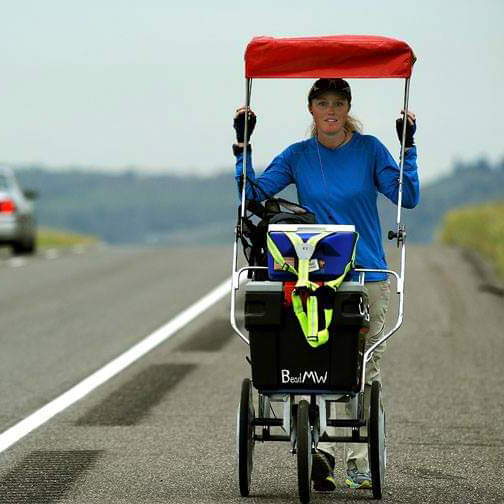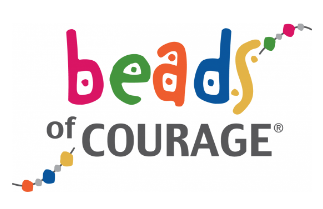Stacie Eichinger

Extreme Outdoorsman & Adventurer
Walker Extraordinaire
Beads of Courage Summer Challenge Ambassador
Stacie Eichinger knows a thing or two about walking a mile in the shoes of someone else and she hopes to encourage others to lace up their sneakers.
Eichinger has, literally and figuratively, gone the distance for Beads of Courage: In 2013, she walked 3,575 miles across America to raise funds for the nonprofit.
This summer, she has served as a Summer Challenge Ambassador while relearning how to walk and hike as she heals from a badly broken leg and a fractured back.
“Going from someone who has walked across the country to someone who is not able to walk at all and is learning to trust my feet again has been quite an experience. It has really made me appreciate the little things in life,” said Eichinger, 38, who describes herself as physical activity enthusiast and “extreme outdoorsman.”
Grand Vision Meets Extreme Adventure
Many might also classify Eichinger as an “extreme adventurer” with big dreams—for travel and for life. The Tucson native was barely out of her teens when she decided she was going to travel the world.
“I just worked really hard and saved all my money. I really wanted to see the whole world,” said Eichinger, who made her vision a reality by working two jobs—one in a garden center and one with a landscaper.
She worked for nine months out of the year and then traveled for the remaining three. Her jobs were accommodating since she traveled during the slow season; they welcomed her return during the busy season.
“I have always wanted to explore and once I decide to do something, I figure out how to make it happen,” said Eichinger.
Making it happen was a practical, step-by-step process: Eichinger read books, watched videos, searched online websites, blogs and other resources, and centered her plans around points of interest. Rick Steves became a trusted travel guru. She planned and budgeted extensively and realistically, starting her travels in Europe and expanding from there.
“When people think of traveling the world they think it is too expensive, but it doesn’t have to be. You find an airline ticket and choose a time frame and work within your budget,” she said.
Eichinger, who often traveled alone, said that there are many 20-, 30- and 40-somethings in search of travel companions. She relished the chance to meet others during her travels.
“You just have to go with an open mind. I met so many like-minded people who I explored with for a day or a week. There are plenty of individuals and groups looking for others to travel with,” she said.
Ultimately, Eichinger believes her travels have shaped every aspect of her life, including her career and relationships. From having her passport stolen in Kenya to experiencing the difficulties a woman alone faces in Egypt, her travels have gifted invaluable insight into people and places.
“You meet so many cool people when you travel, and I have always been a person who says, ‘Trust people.’ One of the biggest lessons I learned was when I was in Africa. I had my passport stolen right out of my hand. That made me learn to trust people, but to keep my eyes open. Also, pay attention, watch body signs and listen to your gut,” she said.
An Epic Walk For a Cause
The lessons she learned abroad have translated to the home front, where Eichinger developed a new travel plan after reading about a gentleman who walked across the world.
“As a 25-year-old, I decided walking across the country would be an epic way to finish my 20s, so I spent three years planning it. Then I realized if I was going to do this, I wanted to walk for a cause. That was when I reached out to Jean Gribbon,” said Eichinger.
Eichinger joined the Carry a Bead Program with a plan to carry beads for Team Beads of Courage. Each metal shoe bead was accompanied by a note detailing the number of miles walked and the states through which the bead was carried.
She put her plan into action on May 8, 2013, in Ocean City, WA, and continued for 267 days. She finished in Savannah, GA, on February 1, 2014.
Those 3,500-plus miles were a revelation for Eichinger and for the Beads of Courage members who received the shoe beads at 21 hospitals along her route. To this day, she is inspired by the journey.
“I talk about Beads of Courage and my walk almost every day. Whenever I have a day where I am bothered by the heat or the bugs or other little things, I remember that when I was having a tough day on my walk, I told myself that our worst days really aren’t bad compared to everything the kids with Beads of Courage go through each day,” said Eichinger.
The walk proved transformative on multiple fronts, showing Eichinger that she could push herself beyond her perceived capabilities.
“I own my own landscape business in Civano now: I am The Gardenurse. I have always loved being outside and working with plants, but I started my business because I gained the courage during the walk. I realized that if I could walk across America, I could run my own business,” she said.
That sense of conviction has become particularly vital during the past several years as Eichinger has faced her own emotional and physical struggles.
In 2021, Eichinger’s mom, Jean, was diagnosed with pancreatic cancer. Shortly thereafter, Eichinger suffered a spiral fracture to her fibula and a displaced tibia while canyoneering. As a result of the serious leg fracture, she was unable to walk or to help care for Jean, who lost her battle to cancer in July 2021. A few months later, when Eichinger was finally starting to walk again post-surgery, she was involved in a bad car accident and then she broke her back in April 2022.
As summer draws to a close, Eichinger is finally starting to feel better both mentally and physically. She credits the outdoors—and a group of caring and supportive friends along with her fiance, Doug Smith—for helping her to heal.
“Being able to go outside and move a little again is really helping. I have an amazing group of friends who are doing easy hikes and walks with me and being active is the best form of therapy,” Eichinger said.
A Strategy for Trying Times: Seven Tips for the Summer Challenge and Beyond
As an extreme outdoorsman who went from warp speed to immobility and is now working her way back, Eichinger offers inspiring advice to others whose plans for the Beads of Courage Summer Challenge may have been delayed or de-railed:
- It’s never too late to start a personal challenge or to raise awareness for Beads of Courage (https://beadsofcourage.org). Eichinger encourages both prospective and recovering athletes to start slow by setting small, attainable goals. “Whether you are someone who is recovering from an injury or someone who has never walked a day in your life, get out a map and choose a couple of blocks or a quarter-mile and start walking. Start with something that is not too scary or too difficult so that you can feel successful,” said Eichinger.
2) Keep a log to record your progress.
“I like having something to refer to. If I choose to walk a mile every day, then I keep track of how fast I walked. If I am dog-tired after walking a mile and plan to do it all week, I time myself and try to do it just a bit faster or sometimes add a little distance. I find it helps to record what I am doing so I can see my progress,” said Eichinger.
3) Don’t get lost in negative space: Reach out to others.
“Many people get lost in negative space in their own minds and don’t reach out to other people. Reaching out to people who love you and want to help take care of you is so important,” said Eichinger.
4) Physical therapy is a must to regain strength and mobility post-injury: It is the gift that keeps giving. “Once my back was strong enough, I went to physical therapy for a long time to learn to walk again. Without that, I don’t think I would have the mobility I have now,” said Eichinger.
5) Mental therapy can help you to move forward literally and figuratively. “Physical therapy is huge after an injury, but so is mental therapy. My therapist is the one who helped me to realize that I was stuck in my own head,” said Eichinger.
6) Explore alternative outlets while healing. When mobility is limited, Eichinger suggests trying a new activity: Consider taking up knitting, reading, gardening, painting or other recreational hobbies. “If you are an active person and you can’t do the things you usually do, you need other outlets. I had one friend bring me adult coloring books and we spent hours coloring together,” said Eichinger.
7) The simple answer to every question: Just live life.
“My philosophy is simply to live life. People ask the question, ‘What is the meaning of life?’ I think the answer is just to live it. People spend so much time now playing on their phones or watching TV, and I say, ‘Just get out and live,’” said Eichinger.
